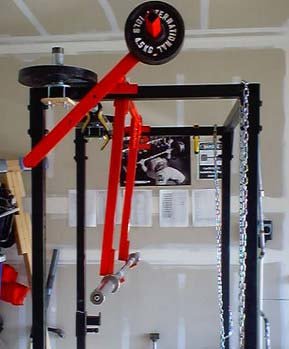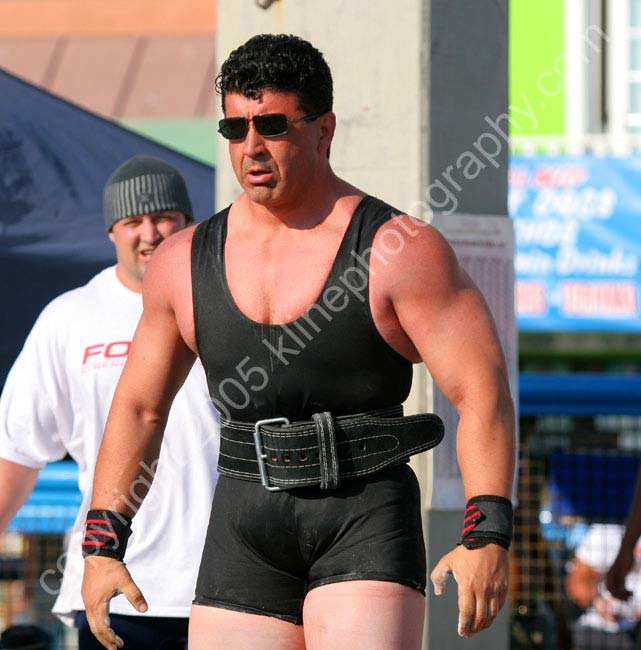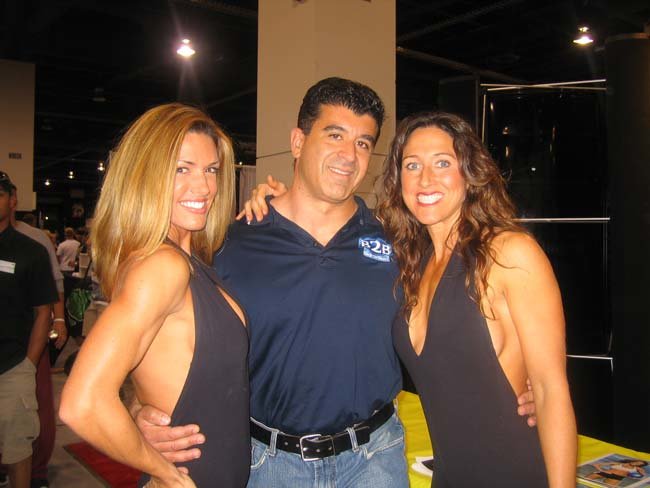I am a long time health enthusiast, nutritional supplement "junkie" as well as a competitive powerlifter. I consider myself a powerlifter who concedes having the bodybuilder mentality of wanting to look physically fit, and this is the area I would like to discuss. In other words, why powerlifting and not bodybuilding?
Powerlifting and bodybuilding are very closely related forms of weight training. Of note is that early bodybuilders of the 1940's and 1950's trained in a manner that focused as much on the improvement in strength of the primary lifts as it did on the development of the specific muscle groups.
However, current day availability of many different types of weight training machines has significantly shifted the focus away from performance of the powerlifting lifts by bodybuilders.
Described simply, powerlifting is training to maximize one's strength in the squat, bench press and deadlift with the end goal to achieve a PR (personal record) in each lift for the performance of one repetition. Bodybuilding is training to maximize the development (size) of each individual muscle group in proportion to one another.
Why Powerlifting Over Bodybuilding?
So why choose powerlifting over bodybuilding? For that matter, why even label yourself one or the other? I believe that for someone to devote themselves to any endeavor, a level of fulfillment must be experienced. When I first began weight training, I was initially interested in the physical changes that occurred rather quickly.

It is an intoxicating feeling to see your body transform before your own eyes over a period of months. So initially, I certainly derived fulfillment from weight training. However, for me, the noticeable changes experienced initially became quickly less and less as I continued to train. Within a few years, it became clear to me that I was limited greatly by my own genetics for adding muscle to my body.
Progressing
In an attempt to continue progressing, I began to devour articles on weight training found in the popular bodybuilding magazines. I applied the Weider principles, tried Mike Mentzer's Heavy Duty training and the various workouts of the bodybuilding stars in an effort to progress.
I became quite knowledgeable in nutrition and the benefits of nutritional supplements. I tried the recommended diets for building muscle mass, implementing bulking cycles and cutting cycles. By the age of 25, with a solid 7 years of "bodybuilding" under my belt, I had managed to go from my untrained bodyweight of 150 lbs to a solid (not lean or ripped) 175 lbs, at 5' 9" tall. I guess, that could be considered progress by some.
Though frustrated by my lack of "gains" for the next few years, I continued to train like a bodybuilder when I was fortunate enough to stumble upon some articles by author Stuart McRobert. McRobert was a proponent of super hard, but infrequent training on a few basic movement to what he called, "hardgainers".
I learned later that McRobert was passing along a training concept that originated in back in the 1930's by Joseph C. Hise, a pioneer in weight training and the originator of heavy weight, high rep "breathing" squats for attainment of fast gains in strength and size.
So, instead of lifting weights 5-6 times per week, doing 10-15 sets per body part, considered by most as the only way to train to build muscle, I began to train on McRobert's version of Hise's 20 Rep Breathing Squat program.
Routine Is As Follows:
- 1 set of 20 reps of squats, followed immediately by 1 set of dumbbell pull-overs for 20 reps (for expansion of the chest and ribcage)
- 2 sets of 5-8 reps of bench presses and 2 sets of 5-8 reps in either pull-downs/chins or barbell rows, twice per week.
 Click Here For A Printable Log Of The 20 Rep Breathing Squat Program.
Click Here For A Printable Log Of The 20 Rep Breathing Squat Program.
That's right, 2 whole days of training and 5 days of rest. The key to the plan was the 20 reps of squats, because you'd start with a weight you could do 10 difficult reps with, but would force yourself to do 20 by taking deep breathes in between each rep after the 10th.
By the 20th rep, you would struggle to rack the bar, then lay down onto a flat bench and perform the dumbbell pullovers. Most of the time I would just collapse to the floor afterwards, where I'd then lie for the next ten minutes panting.
Believe me; I got the strangest looks from the other gym members, some of which thought I might need medical assistance. The hardest part of all of this was that each workout I had to try and add 5lbs to the squat weight, which despite my doubts, I managed to do almost every time.
As instructed, I also increase my eating and protein shake consumption, which was the most enjoyable part of the program. In my first six week training cycle, I ended up able to squat with 245 lbs for 20 reps, 60 lbs more than when starting the program.
I also gained a solid ten pounds of bodyweight in those 6 weeks and learned how to push my body harder than I thought was possible. I considered this a major breakthrough in my understanding of how to get stronger and "bigger". You had to get stronger to get bigger and the best way to do that was by working very hard on basic movements (squat, bench, rows, chins, dips, and deadlifts) while not overworking your body by training too frequently.
Still Training
Flash ahead about 9 years or so, I'm 36 years old, it's the year 2000 and I am still working out! I'm proud of this as I notice that a lot of people my age who worked out have stopped and have let themselves go a bit (or a lot). I maintain my weight at about 190 lbs now, look fit, fairly lean depending on whether I was starting or ending a diet phase.
I have defined my training after all the years into a few simple parameters.
- Lift weights 3-4 days per week.
- Make squats the basis of leg training, bench press the basis of chest/shoulder training and barbell rows the basis of back training.
- Keep reps on the low side, 5-8 reps, sometimes do 3 rep sets (more weight!) for big body parts, a bit higher for arms and shoulders.
- Use mild cardio, 10 minutes prior to training with weights, to warm up the body.
A Note On Cardio: A quick aside and note on cardio, I hate it! Yes, I know it has some value (good for the heart, improves circulation), but I think people have been misinformed about its application. Will it allow you to transform your body into a leaner, stronger machine? No, not without a weight training component added in.
Look at the leanest, most in shape looking people in your gym. Are they hitting the weights, or are they on the cardio equipment? I think the problem with cardio training is that it is overemphasized by the very people who are looking to cut body fat down.
These people seem to toil away for years though with the blind faith that if they just keep doing it, long enough, their bodies will change. I won't drone on any longer about this issue (another article perhaps). I'll just say that if you enjoy DOING cardio, you get off on the endorphin rush, like to sweat (that's water and salt dripping off you, not body fat) then enjoy. If you want to TRANSFORM your body, then focus on weight training first, cardio second.
Strength, Not Contests
By this time, I am certain that I will not be getting up on a bodybuilding stage, oiling myself up and posing in little tiny Speedo like trunks. I want to say that I do understand why someone would enter a bodybuilding show. Not necessarily because you think you can win, but because it gives you a reason to train. It gives you a reason to diet.
Hell, it gives you a reason to do CARDIO (sorry, couldn't help it)! Like I said, I knew I wasn't going to enter a bodybuilding contest because, though I looked good by the average person's perspective, and had some muscle on me, I just didn't have that higher level of muscle mass that's needed to consider the prospect.
I can blame this on my lack of genetics or a lack of interest in utilizing chemical assistance (steroids) and certainly, lack of wanting to train just to grow show muscles. No, by now, I was more interested in training to get STRONGER in the basic lifts, and even the smaller lifts like curls and dumbbell lateral raises.
I don't know what drew me to wanting to be stronger. Maybe because it didn't come natural or easy for me and I couldn't accept that. Yes, I was more interested in being stronger, period and however that looked, that's how I wanted to look.
So How Was I Doing?
Age 37 years old, bodyweight 190-195 lbs, height 5' 9" (on a good day, we shrink you know as we age) and here are my lifts; Squat: 340 lbs for 1 rep, Bench: 280 lbs for 1 rep, Deadlift: Did not do these much, but maybe 365 lbs for 1 rep.
This is what most people would consider average level strength. I still remembered what Stuart McRobert had laid out as a good level of strength was and what was obtainable for the majority of trainers at a bodyweight of 190 lbs and height of 5' 9"; Squat: 400 lbs, Bench: 300 lbs and Deadlift 500 lbs!
Wow, after 19 years of training, I still had not achieved those numbers (except for the bodyweight and height). It just wasn't fair. I trained regularly, while not overtraining. I drank protein shakes daily, sometimes 2 on top of 3 protein based meals. On top of that, I'd literally taken every nutritional supplement introduced to the marketplace from 1985-2000.
Here's a sampling for your entertainment starting from the earliest to the most recent:
- L-arginine and l-ornithine capsules (10grams and 5 grams before bed)
- Orchic, adrenal and pituitary glandular tablets
- Desiccated liver tablets (50 per day, feeds the blood)
- Organic fertile uncooked eggs, mixed with heavy cream (12 per day)
- Dibencozide
- Boron tablets
- Vitamin B-15
- Sarsaparilla tinctures, (thanks Dan Duchaine)
- Cybergenics Kit
Of course, this is in addition to multi-vitamins, and fish oil capsules, which I still take to this day.
Needing Help
I remember visiting my family in New York during May 2000 and working out with my childhood friend, Stephen, at Gold's Gym in a few miles from my parents home. Steve was always a good squatter and on this day, I think I worked up to my usual weight of 315lbs for a few reps.
Stephen routinely handled 100 lbs+ more than me for reps, though he weighed 10 lbs less than me. On that day, he decided to go for more than he'd ever attempted before for one all out rep. He loaded the bar to 500 lbs, wrapped up his knees, cinched his belt tight and carefully unracked the imposing weight, taking a few steps back from the squat rack.
He braced himself, squatted down to parallel, drove the weight up and carefully stepped forward as I steered him forward, towards the rack. Wow, it was difficult, but he got it clean. Truly an impressive display of strength by my friend, and I was truly happy for him.
As we continued to train, I distinctly remember talking to him about how for the longest time, I thought that I'd rather train by myself as I didn't think after all these years that there was anything else I could learn about training from someone else.
But, on this day, I told him that if I thought there WAS someone out there that could teach me more and help me get stronger, I would love to just let them train me. I was tired of trying to figure everything out for myself. It would be a relief to be just a student for a change.
Powerlifting
The following month, June 2000, I pick up a local health publication called Fun N' Fit and leafed through it when I see a very small ad; "Huge Iron Gym, only powerlifting club in Las Vegas, $20 per month dues". I was vaguely familiar with powerlifting as a sport.
I'd leafed through a Powerlifting USA magazine a few times, but never thought of it as a different training philosophy or anything. I remember thinking it was strange for a place like Las Vegas to actually have such a club. How great! I had to check this place out.
I go over there one day and I was excited at what I found. First off, Huge Iron Gym was in one of the skuzziest parts of town I've seen since living in Las Vegas. The "gym" was housed in a 500 square foot space. There are 3 strange looking squat racks, which I learned were called mono-lifts.

Three benches, a cable setup for pulldowns and rows, a rack of dumbbells, and a few weird looking apparatuses I had never seen before. And lot's of weights and barbells! No cardio equipment (ha, ha). What a sh!thole, I loved it! I meet the manager, Tony and a few members Scott, his wife Susan and two younger guys, Lance and JR.
I give Tony $20 on the spot. I'm not there 5 minutes when Scott tells me to go onto a bench and show him how I bench press. I was excited to demonstrate my form gleamed from 19 freaking years of training. I'm sure to impress him; he doesn't know who he's dealing with here.
Do you know what he says,
"You're flaring your elbows out. You're not a bodybuilder trying to work his pecs. If you want to use more weight in the bench press, learn to keep your elbows in. Also, stop pushing the bar over your face in an arch. You need to push up off the chest in a straight line.
Not only that, but learn to bench with an arch in your lower back. When you bring the bar down to your chest, lower to just below the nipples while simultaneously reinforcing your arch by trying to raise your chest to the bar without raising your butt off the bench."
Wow!
In 2 minutes, I changed from thinking I knew all there was to know about training to realizing that I know next to nothing about training to get really STRONG.

A Powerlifter: Proud & Strong
The details of my five years of powerlifting I will save for a future article. I proudly refer to myself as a powerlifter now and will correct anyone who mistakenly refers to me as a "bodybuilder". What I've learned is that though powerlifting and bodybuilding are closely related types of training, there is a MAJOR difference in training for strength and training to grow muscle.
It seems to me in hindsight that when I set my focus on trying to build and increase the size of my muscles, even though I was training with what I considered to be heavy weights and low reps, I did not get substantially stronger as a result, after my initial 5 years of working out.
For example, my bench press one rep max was stalled at 280 lbs from 1990 to the year 2000. During that time, I tried various bodybuilding based routines that claimed to increase strength to no avail. It's hard to admit looking back that I was MAINTAINING my strength for those 10 years but that's exactly what I was doing. I probably could have devoted half the time to training if I had only wanted to maintain my strength.
Conclusion
I am happy to say that I have experienced my best gains in strength these last 5 years than I have the previous 19 years of training. I've met some new friends, and have experienced great fulfillment from competing in powerlifting contests and have consistently improved in each one I've entered.

The competitions not only give me a sense of fulfillment, but give me a REASON to train (and we don't wear Speedos, but do wear some "interesting" types of powerlifting apparel). Oh, and ironically, I now carry more muscle on my body than I ever have, an unanticipated "side effect" of trying to get stronger and stronger all the time.
